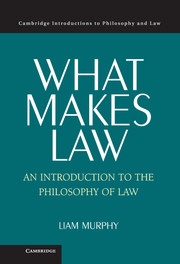1 - Introduction
Published online by Cambridge University Press: 05 July 2014
Summary
Philosopher: We have hitherto spoken of Laws without considering any thing of the Nature and Essence of a Law; and now unless we define the word Law, we can go no farther without Ambiguity, and Fallacy, which will be but loss of time; whereas, on the contrary, the Agreement upon our words will enlighten all we have to say hereafter.
Lawyer: I do not remember the Definition of Law in any Statute.
(Hobbes [1681] 1971, 69)Different kinds of philosophical questions can be asked about law. John Rawls’s major works (1996, 1999) can be seen as treatises on what the content of law should be if a state is to be both legitimate and just. Other inquiries lie more clearly within legal theory in that they evaluate different ways of designing the kind of governance structure we call law (Kornhauser 2004): Should we prefer formally realizable legal rules (Kennedy 1976), or more open standards? What principles must legal rules or standards satisfy to realize the moral ideal of the rule of law, and thus govern us appropriately as responsible agents?
Though this book touches on such questions, this is usually to contrast them with my main topic, which is the nature of law. There are two main questions, though my focus is overwhelmingly on the first of them. When we ask what makes law, we may have in mind the question of how we determine the content of the law in force. This is the question of the grounds of law. The ancient issue here – though it has become a major concern of philosophy only over the past two hundred years or so – is whether moral considerations are ever relevant when we are trying to find out what the law is, as opposed to what it ought to be. The other question we may have in mind, which I will not reach until the end of this book, is that of what makes a normative order an order of law, rather than something else, such as conventional morality, or etiquette, or a code of honor among thieves.
- Type
- Chapter
- Information
- What Makes LawAn Introduction to the Philosophy of Law, pp. 1 - 6Publisher: Cambridge University PressPrint publication year: 2014

